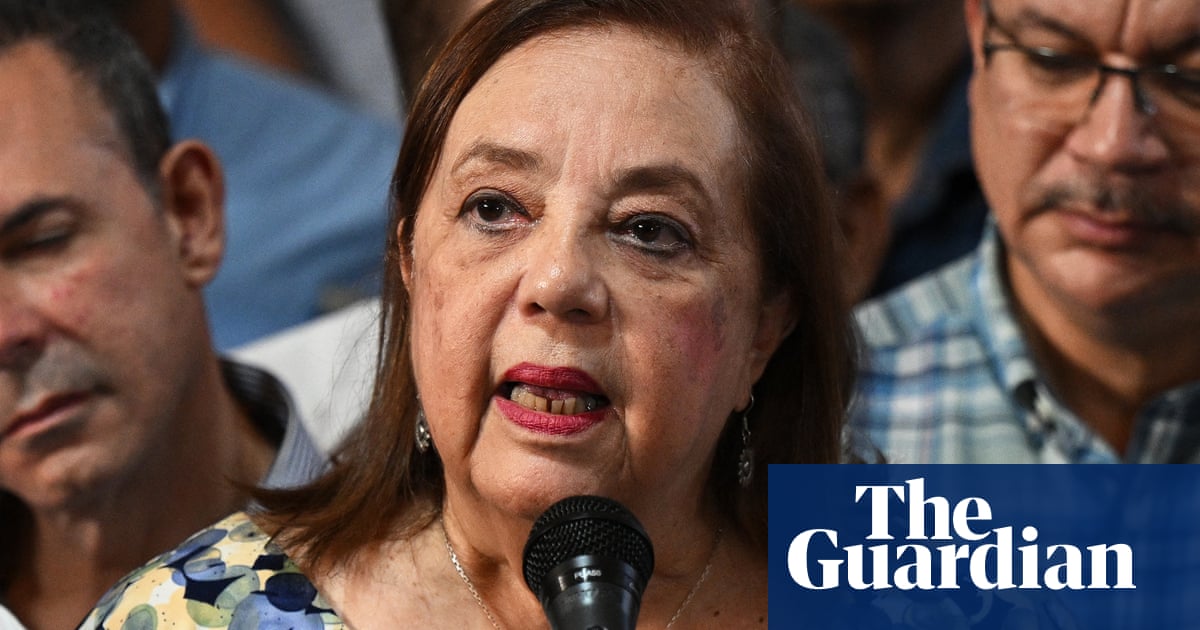A chorus of Latin American nations, including Brazil and Colombia, have voiced concern over the deteriorating political situation in Venezuela after the opposition politician best-positioned to challenge its strongman leader, Nicolás Maduro, in July’s presidential election was prevented from registering for the vote.
Corina Yoris, an 80-year-old philosopher, was little-known outside academic circles until last Friday, when she was catapulted on to the frontline of Venezuela’s long-running political crisis by being named as the substitute for María Corina Machado, a prominent opposition figure who had been banned from running in the election.
Members of the opposition had hoped the octogenarian grandmother of seven might prove an unconventional yet effective adversary capable of discombobulating the 61-year-old Maduro, who has held power since becoming president after Hugo Chávez’s 2013 death. Maduro’s re-election, in 2018, was widely denounced as an illegitimate farce by western governments.
However, on Tuesday, Yoris – the unity candidate for an alliance known as the Unitary platform – said she had been unable to register her candidacy on the electoral council’s online system before a midnight deadline.
“The will of the Venezuelan people who want a change in this country is being violated,” the academic turned presidential hopeful told reporters.
The scuppering of Yoris’s candidacy prompted an unusually firm response from the governments of Brazil and Colombia, which have both been trying to coax Maduro back towards democratic governance.
“Based on available information, the candidate put forwards by the Unitary platform … was prevented from registering, which is not compatible with the Barbados agreement,” Brazil’s foreign ministry said, in reference to a deal between Maduro’s government and the opposition last October intended to ensure free and fair elections.
“So far, there has been no official explanation for this obstruction,” the Brazilian ministry added, voicing “concern” over the situation.
Colombia’s foreign ministry also voiced concern and warned that recent developments in Venezuela might “affect the confidence of some sectors of the international community in the transparency and competitiveness of the electoral process”.
Colombia’s intervention prompted a sharp rebuke from Venezuela’s foreign minister, Yvan Gil, who accused Bogotá of “gross interference” in his country’s domestic affairs.
Other Latin American countries weighed in, with Guatemala’s centrist president Bernardo Arévalo denouncing the Venezuelan government’s “harassment and persecution” of its opponents. Such actions, Arévalo tweeted, reinforced an “anti-democratic system”.
The foreign minister of Uruguay, Omar Paganini, told reporters recent events suggested that “Venezuela is consolidating itself as a dictatorship which is moving away from any kind of democratic practice”.
Addressing supporters earlier in the day, Machado accused Maduro’s regime of deliberating blocking her namesake’s candidacy with its “crude and grotesque” maneuver.
Such efforts would fail, the 56-year-old politician insisted, vowing to fight on until the election. “In Venezuela, there will be clean and free elections, let there be no doubt about it. We are going to take on Maduro and we are going to defeat him,” Machado declared, calling the president’s attempt to sideline Yoris “an act of desperation that exposes his weakness”.
Machado and her party Vente Venezuela have been the target of a ferocious political crackdown in recent weeks as Venezuela’s unpopular president battles to ensure he secures another six-year term in the 28 July vote. Last week two of her closest political allies were arrested.
Phil Gunson, a Venezuela specialist from Crisis Group, said the unusual interventions from the leftwing governments of Brazil and Colombia reflected how “blatantly undemocratic” the actions of Maduro’s government had been. “It’s quite obvious that the opposition’s political rights have been grossly violated,” Gunson said.
Gunson attributed the government’s moves to block Machado and her substitute to polls that laid bare the threat she posed to his rule.
“The real problem with María Corina is that Maduro could not possibly beat her. She is so far ahead in the polls that to allow her candidacy was to admit the possibility of defeat,” he said.
Polls also suggest that a candidate backed by Machado would stand a good chance against Maduro, who is widely blamed for leading Venezuela into a catastrophic economic slump that has seen millions of citizens flee abroad.
“So the problem with a candidate backed by María Corina was that such a candidate was also a major threat to Maduro’s continuation in power,” Gunson added.







